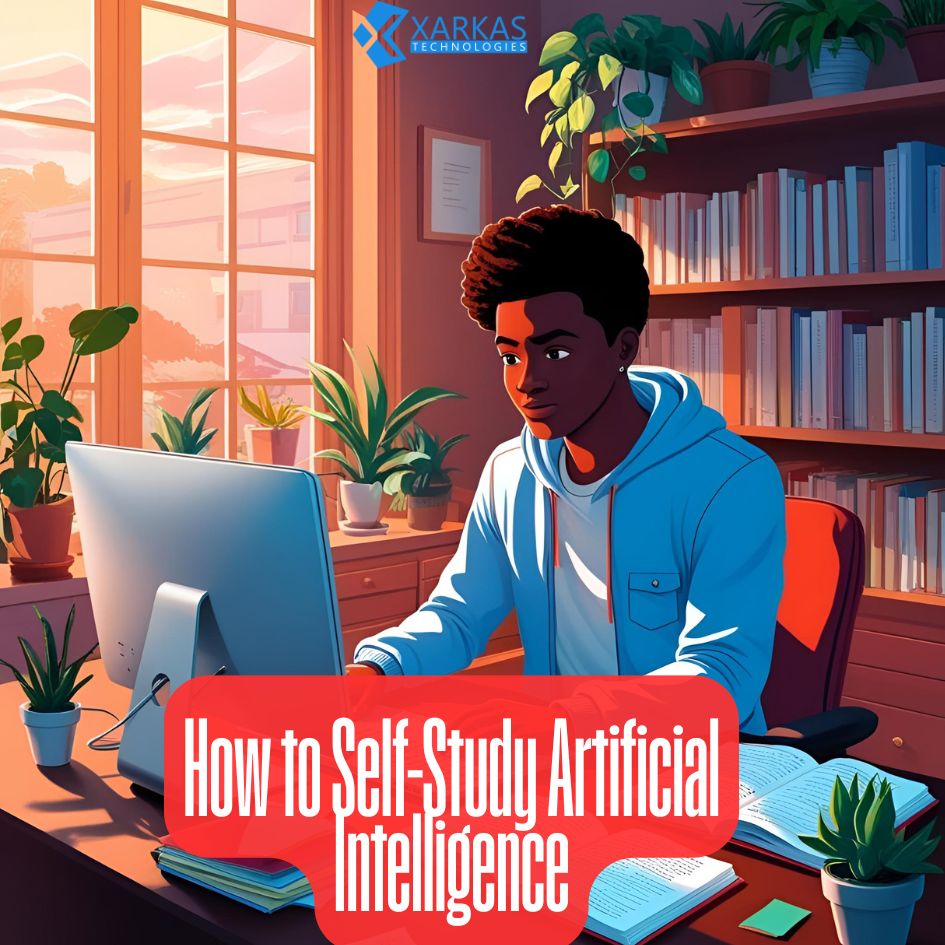
How to Self-Study Artificial Intelligence for Free
In today’s tech-driven world, Artificial Intelligence (AI) has evolved into one of the most transformative fields of the 21st century. Mastering AI is no longer restricted to elite institutions or expensive courses. With the explosion of open-source materials, anyone with dedication and strategy can learn AI independently — and at zero cost. This comprehensive guide will provide a detailed roadmap to self-study artificial intelligence for free, using world-class resources, structured learning, and hands-on projects.
Table Of Content
- Why Self-Studying AI Is More Accessible Than Ever
- 1. Start with the Fundamentals of Programming
- Top Free Resources to Learn Python
- 2. Understand the Core Concepts of Artificial Intelligence
- Recommended Introductory Courses
- 3. Dive into Mathematics for AI
- Top Free Math Resources
- 4. Learn Machine Learning with Free Industry-Recognized Courses
- Top Free ML Courses
- 5. Get Hands-On with Deep Learning
- Best Free Deep Learning Resources
- 6. Work on Real-World AI Projects
- Project Ideas
- Where to Find Projects and Datasets
- 7. Engage with the AI Community
- Top AI Communities
- 8. Stay Updated with AI Research and Trends
- Recommended Platforms
- 9. Build a Portfolio and Showcase Your Work
- 10. Explore Career Paths and Certifications (Optional but Free)
- Notable Free Certifications
- Conclusion: You Can Learn AI for Free — With Discipline and Strategy
Why Self-Studying AI Is More Accessible Than Ever

Self-learning AI has become feasible due to the abundance of free online courses, eBooks, datasets, open-source frameworks, and community support. These resources empower individuals to master everything from basic AI concepts to advanced machine learning, deep learning, and natural language processing, without spending a dime.
1. Start with the Fundamentals of Programming
Before diving into AI, you must gain proficiency in Python, the most commonly used programming language in AI development.
Top Free Resources to Learn Python:
-
Python.org – Official Python documentation and tutorials.
-
Automate the Boring Stuff with Python – A beginner-friendly book available for free online.
-
CS50’s Introduction to Computer Science by Harvard (edX) – Comprehensive programming foundation.
Tip: Focus on mastering Python libraries like NumPy, Pandas, and Matplotlib early on.
2. Understand the Core Concepts of Artificial Intelligence
To build a strong AI foundation, it’s vital to understand the key branches of AI, including:
-
Machine Learning (ML)
-
Deep Learning
-
Natural Language Processing (NLP)
-
Computer Vision
-
Robotics
Recommended Introductory Courses:
-
Elements of AI – A beginner-friendly, completely free course created by the University of Helsinki.
-
Google AI Education – Offers a wide range of AI learning materials, from beginner to advanced.
3. Dive into Mathematics for AI
AI is deeply rooted in mathematical principles. You should become comfortable with:
-
Linear Algebra
-
Probability and Statistics
-
Calculus
-
Discrete Mathematics
Top Free Math Resources:
-
Khan Academy – Extensive lessons on math fundamentals.
-
Essence of Linear Algebra (YouTube) – A visual and intuitive series on linear algebra.
4. Learn Machine Learning with Free Industry-Recognized Courses
Machine Learning is a core component of AI. Focus on supervised, unsupervised, and reinforcement learning techniques.
Top Free ML Courses:
-
Andrew Ng’s Machine Learning (Coursera) – Stanford’s most famous free ML course.
-
Google’s Machine Learning Crash Course – A fast-paced, practical approach to ML.
Key Tools to Master:
-
Scikit-learn
-
TensorFlow
-
PyTorch
5. Get Hands-On with Deep Learning
Once you grasp ML, progress into deep learning, which powers technologies like speech recognition, autonomous vehicles, and AI image generation.
Best Free Deep Learning Resources:
-
DeepLearning.AI’s Deep Learning Specialization – Free to audit on Coursera.
-
Fast.ai – A top-rated free deep learning course using PyTorch.
Focus Areas:
-
Neural Networks
-
Convolutional Neural Networks (CNNs)
-
Recurrent Neural Networks (RNNs)
-
Transformers and Attention Mechanisms
6. Work on Real-World AI Projects
Practical experience is the bridge between learning and mastery. Build mini-projects and contribute to open-source repositories to reinforce your knowledge.
Project Ideas:
-
AI Chatbot using NLP
-
Digit recognition with CNNs
-
Movie recommendation engine
-
AI for stock price prediction
Where to Find Projects and Datasets:
-
Kaggle – Data science competitions and datasets.
-
GitHub – Explore open-source AI repositories.
-
Google Dataset Search – A searchable database of free datasets.
7. Engage with the AI Community
Learning AI in isolation can be challenging. Join online communities to get feedback, ask questions, and stay updated.
Top AI Communities:
-
Reddit: r/MachineLearning, r/learnmachinelearning
-
Stack Overflow
-
Kaggle Forums
-
AI Discord Servers
8. Stay Updated with AI Research and Trends
AI is evolving rapidly. To stay competitive, regularly follow AI research papers, news, and industry trends.
Recommended Platforms:
-
arXiv.org – Preprints of research papers.
-
Papers with Code – Combines papers with implementation.
9. Build a Portfolio and Showcase Your Work
To transition from learner to practitioner, create a professional portfolio:
-
Host your code on GitHub
-
Write technical blogs or tutorials
-
Publish your projects on LinkedIn, Medium, or a personal website
Employers and collaborators often look for real-world applications of knowledge over certifications.
10. Explore Career Paths and Certifications (Optional but Free)
If you’re pursuing AI professionally, free certifications can add credibility to your profile.
Notable Free Certifications:
-
Google AI – TensorFlow Developer Certificate (exam fee applies, but study material is free)
-
Microsoft Learn AI Path
-
IBM AI Engineering (Coursera audit)
Conclusion: You Can Learn AI for Free — With Discipline and Strategy
Artificial Intelligence is not only for computer science graduates or PhDs. With structured resources, consistent practice, and curiosity, anyone can master AI independently. Following the roadmap above, you can build your knowledge base, develop critical skills, and eventually apply AI in real-world projects and careers — all without spending a cent.







No Comment! Be the first one.